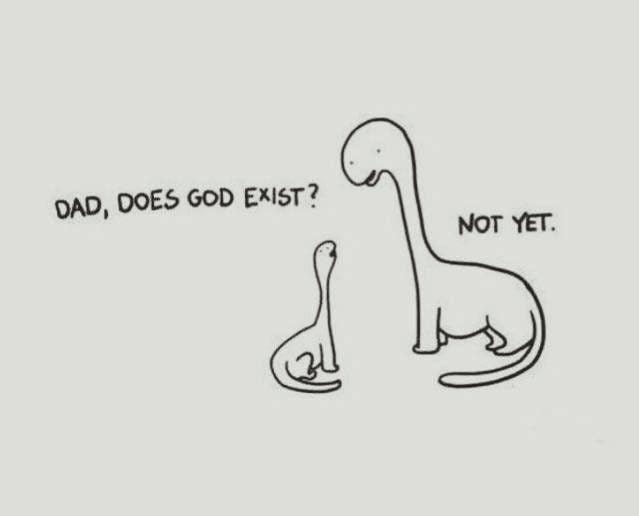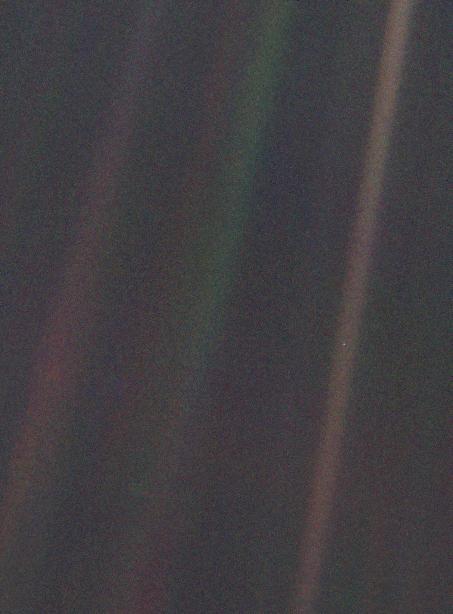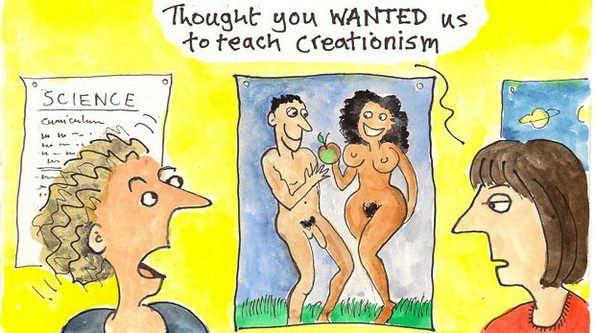
One of the questions most asked by children has to do with the existence of God. Children quickly learn that things require a maker/creator. When they sit at the dining table for dinner, they see food on a plate, ready for them to eat. Children know that mommy, daddy, or KFC cooked dinner. The food did not magically appear on a plate. Someone had to prepare and cook the food. The same goes for the dining room table, dinnerware, and eating utensils. Someone, somewhere, designed, manufactured, shipped, and sold these goods. And the same is true for the food itself. A farmer planted crops and/or raised animals to provide the food. From start to finish, we see human choices and actions. This process reminds me of Jimmy Stewart’s memorable (and hilarious) prayer in the movie Shenandoah:
Lord, we cleared this land. We plowed it, sowed it, and harvested. We cooked the harvest. It wouldn’t be here, we wouldn’t be eatin’ it, if we hadn’t done it all ourselves. We worked dog-bone hard for every crumb and morsel. But we thank you just the same anyway, Lord, for this food were about to eat. Amen.
Most parents teach their children the basic rules of life, one of which is that if you don’t work, you don’t eat. Food doesn’t magically appear in the cupboards. Having food requires labor, either in a garden or working a job that provides money to purchase it. This is the way it has always worked. Sitting around praying for God to provide only leaves petitioners with growling, empty stomachs. King David, of Biblical fame, wrote one of the biggest whoppers ever told when he stated:
I have been young, and now am old; yet have I not seen the righteous forsaken, nor his seed begging bread. (Psalm 37:25)
Millions and millions of Christians will go to bed tonight hungry. They are the righteous spoken of by David. No matter how much these followers of Jesus pray, seeking God’s providential intervention, their plates will remain empty. God is not going to show up with a grocery truck. Having food requires human work, along with political environments where sustenance farming is valued and supported. In many of the countries facing famine, religion plays a prominent part in the lack of food. Catholicism, in particular, with its anti-birth-control, anti-abortion policies, encourages women to have large families. We see the same insane lack of family planning in Islāmic countries. When there are already too many mouths to feed, does it make any sense to have MORE children, thus exacerbating the lack of food security? Of course not. But, instead of handing out birth control and making abortion services readily available, religious leaders tell their followers to continue fucking for the glory of God, trusting that he will provide for their daily needs. How’s that working out?
Children should be taught when they are young that the only way things get done is for them to do it. Parents don’t help their children grow into responsible adults if they continue to do for them what they can do for themselves. Polly and I had many faults when it came to raising our six children, but not when it came to teaching them the value and importance of work. At an early age, our children learned that there was a connection between work and results. Want a weed-free garden? Someone has to weed it. Want a clean bedroom? Someone has to clean it. Parents wrong their children, crippling them as adults, when they do things children can do for themselves. When our children reached their teen years, they wanted stuff — cars, clothing, shoes, CDs, and money to spend on entertainment. Polly and I didn’t give them money, not even an allowance. If they wanted the trappings of our capitalistic society, there was one way to get it — work! And so they did. Learning this has served them well as adults; as a result, our children have often been applauded and rewarded for their work ethic (and been known as no-nonsense workers who give an honest day’s work for their pay).
My point is this: everywhere we look we see human endeavor at the heart of this experience called life. What we have comes not from a dime store deity somewhere who doles out his goodness and blessings according to some sort of mysterious lottery. While we humans fail in many of our endeavors, we know that the only option we have is to try again or try something different. The burden of security, prosperity, and success rests on us, not on a mythical God.
It is for these reasons that it is frustrating to hear parents, when asked by their children, where did God come from? respond with theological mumbo jumbo about God always existing, and that no one created him. History tells us that God — all gods — are of human origin. Take the Christian God. Has this God always existed? Of course not. Humans, attempting to explain the world around them and their place in it, invented Gods to provide a larger-than-life explanation to what, at the time, seemed unanswerable questions. For centuries now, humans have been appealing to the gods as the locus of their origin. These appeals were put in written forms such as the Christian Bible. When read with unbiased, uninitiated eyes, the Bible provides a fascinating look at the evolution of God, (The Evolution of God by Robert Wright) from the polytheism of the Old Testament to the monotheism of later Old Testament books and the New Testament (though one could argue that Christianity is still polytheistic based on its Trinitarian theology).
When little Johnny asks his mommy or dad, where did God come from? he should be told the truth. Johnny, ancient humans created God (s) as a way to explain their world. Our deity, the Christian God, was brought to life six or so thousand years ago by polytheistic Middle Easterners. Our God has been remade numerous times. Today, our God is very different from the God of Adam and Eve. The same could be said for Abraham’s God and the deity of first-century Jews. Humans, as time marches along, tend to shape God in their own image, adapting her to current cultural and tribal norms. While Christians speak of God having supernatural and divine qualities, it is clear to every honest observer that “God” is a human creation, with each worshiper shaping God into a human form that best represents their wants, needs, and desires.
But Bruce, Evangelicals might say, how do you explain the existence of the raw materials used to make things? They had to come from somewhere, right? Using a variation of the God of the Gaps argument, Christians think anything that can’t be answered or known is God. Since no one can answer the “how did it all begin” question, Evangelicals wrongly assert that it is their God who birthed everything into existence. This, of course, is a faith claim for which there is no evidence outside of the Bible. This still leaves Christians with the question, where did God come from? Well, God exists outside of the space/time continuum. And your evidence for this claim is what? Uh, well, um, (hanging head), the Bible says ____________. And now we are right back to a book that was written by men, not God. The Bible, from Genesis 1:1 to Revelation 22:21 is the creation of humans, not a deity.

Perhaps science will one day answer all the questions about our beginning. Maybe not. For me personally, it doesn’t matter. While I might wonder about what happened before the big bang, I know post-bang that science gives us a plausible explanation for our universe and our minuscule, insignificant place in it. This is a good place for me to remind readers of Carl Sagan’s words about our planet:
Look again at that dot. That’s here. That’s home. That’s us. On it everyone you love, everyone you know, everyone you ever heard of, every human being who ever was, lived out their lives. The aggregate of our joy and suffering, thousands of confident religions, ideologies, and economic doctrines, every hunter and forager, every hero and coward, every creator and destroyer of civilization, every king and peasant, every young couple in love, every mother and father, hopeful child, inventor and explorer, every teacher of morals, every corrupt politician, every “superstar,” every “supreme leader,” every saint and sinner in the history of our species lived there–on a mote of dust suspended in a sunbeam.
The Earth is a very small stage in a vast cosmic arena. Think of the rivers of blood spilled by all those generals and emperors so that, in glory and triumph, they could become the momentary masters of a fraction of a dot. Think of the endless cruelties visited by the inhabitants of one corner of this pixel on the scarcely distinguishable inhabitants of some other corner, how frequent their misunderstandings, how eager they are to kill one another, how fervent their hatreds.
Our posturings, our imagined self-importance, the delusion that we have some privileged position in the Universe, are challenged by this point of pale light. Our planet is a lonely speck in the great enveloping cosmic dark. In our obscurity, in all this vastness, there is no hint that help will come from elsewhere to save us from ourselves.
The Earth is the only world known so far to harbor life. There is nowhere else, at least in the near future, to which our species could migrate. Visit, yes. Settle, not yet. Like it or not, for the moment the Earth is where we make our stand.
It has been said that astronomy is a humbling and character-building experience. There is perhaps no better demonstration of the folly of human conceits than this distant image of our tiny world. To me, it underscores our responsibility to deal more kindly with one another, and to preserve and cherish the pale blue dot, the only home we’ve ever known.
— Carl Sagan, Pale Blue Dot, 1994
Our planet, with its seven billion-plus inhabitants, is but a pencil point of light in the vast expanse of space. We who call this planet home are its caretakers. Our future success, prosperity, and life rest in our hands. God, whoever it might be, if anything at all, is not coming to rescue, bless, or take care of us. All we have is each other, and as Jimmy Stewart made clear, it’s up to us to provide for ourselves and those we love. Children deserve to be told the truth about these things. Telling them that there is some sort of Santa Claus-like God only teaches them a deluded view of the world and their place in it. Perhaps there is some sort of deistic God who set the things into motion. I don’t know, and, quite frankly, it doesn’t matter. It is clear, at the very least, that such a deity is not the tiniest bit interested in that which she has created, and that this God has left it up to us to plot the future of the earth and the human race. This is the primary reason I am a humanist. (If you have not read the Humanist Manifesto, I encourage you to do so.) The Humanist Manifesto states:
Knowledge of the world is derived by observation, experimentation, and rational analysis. Humanists find that science is the best method for determining this knowledge as well as for solving problems and developing beneficial technologies. We also recognize the value of new departures in thought, the arts, and inner experience—each subject to analysis by critical intelligence.
Humans are an integral part of nature, the result of unguided evolutionary change. Humanists recognize nature as self-existing. We accept our life as all and enough, distinguishing things as they are from things as we might wish or imagine them to be. We welcome the challenges of the future, and are drawn to and undaunted by the yet to be known.
Ethical values are derived from human need and interest as tested by experience. Humanists ground values in human welfare shaped by human circumstances, interests, and concerns and extended to the global ecosystem and beyond. We are committed to treating each person as having inherent worth and dignity, and to making informed choices in a context of freedom consonant with responsibility.
Life’s fulfillment emerges from individual participation in the service of humane ideals. We aim for our fullest possible development and animate our lives with a deep sense of purpose, finding wonder and awe in the joys and beauties of human existence, its challenges and tragedies, and even in the inevitability and finality of death. Humanists rely on the rich heritage of human culture and the lifestance of Humanism to provide comfort in times of want and encouragement in times of plenty.
Humans are social by nature and find meaning in relationships. Humanists long for and strive toward a world of mutual care and concern, free of cruelty and its consequences, where differences are resolved cooperatively without resorting to violence. The joining of individuality with interdependence enriches our lives, encourages us to enrich the lives of others, and inspires hope of attaining peace, justice, and opportunity for all.
Working to benefit society maximizes individual happiness. Progressive cultures have worked to free humanity from the brutalities of mere survival and to reduce suffering, improve society, and develop global community. We seek to minimize the inequities of circumstance and ability, and we support a just distribution of nature’s resources and the fruits of human effort so that as many as possible can enjoy a good life.
….
Simply put, it’s up to us. Whether it’s avoiding nuclear war or combating the effects of global climate change, it is up to humans, not gods, to change the course of history. Whether we will do so remains to be seen. As long as humans think God is in charge of everything and that she alone can deliver and save us, there is little hope that we will survive to the days when our sun dies and our species ceases to exist. As things stand now, I wonder if we will even make it to the twenty-second century. Religious tribalism, political extremism, amoral (and immoral) capitalism, poverty, global warming, war, and a host of other problems work against our future survival. Our only hope lies in all of us working together for the betterment of the human race and the planet we call home.
Bruce Gerencser, 66, lives in rural Northwest Ohio with his wife of 45 years. He and his wife have six grown children and thirteen grandchildren. Bruce pastored Evangelical churches for twenty-five years in Ohio, Texas, and Michigan. Bruce left the ministry in 2005, and in 2008 he left Christianity. Bruce is now a humanist and an atheist.
Connect with me on social media:
Your comments are welcome and appreciated. All first-time comments are moderated. Please read the commenting rules before commenting.
You can email Bruce via the Contact Form.

